Paediatric Runny Nose (Allergic Rhinitis)
What is allergic rhinitis?
Allergic rhinitis is a common condition in children. It occurs when the nose has an increased sensitivity to allergens in the environment. Common allergens include house dust mite, grass & pollens, animal fur, moulds & fungus. Other elements in the environment (smoke, chemicals, temperature change) can also cause irritation in the nose (non-allergic rhinitis).
What are the symptoms of allergic rhinitis?
Sneezing, itchy eyes, itchy nose, runny nose (rhinorrhoea), sniffing, nasal congestion, blocked nose
How do you treat allergic rhinitis?
Once we’ve identified the allergy, treatment can involve lifestyle modification strategies, pharmacological and surgical options.
Allergy avoidance strategies is the first line of treatment and this is often supplemented with targeted nasal sprays and oral medication. If nasal obstruction is the primary symptom then surgery can be used to unblock the nose and relieve the runny nose (rhinorrhoea) symptoms. Immunotherapy is used to desensitise the nose and can be used concurrently or when other measures have failed.
What does surgery/treatment involve?
Surgery is used to to unblock the nose, relieve the rhinorrhoea and create the space to deliver sprays more effectively into the nose. In children, the adenoids often need to be removed (adenoidectomy) and the turbinates made smaller (turbinoplasty).
What are the risks of surgery for allergic rhinitis?
Although very low risk, all potential risks and complications will be discussed in detail before proceeding with any operation.

